Great Lakes Iron Ore Trade Down in November

Shipments of iron ore on the Great Lakes decreased 19.1 percent from 2024 to 3.4 million tons in November. Shipments were below the month’s 5-year average by 20.3 percent.Year-to-date, the iron ore trade stands at 39.2 million tons, a decrease of 13.2 percent compared to the same point in 2024.Through November, iron ore loadings are 8.1 percent below their 5-year average.Since 1880, Lake Carriers’ has represented the U.S.-flag Great Lakes fleet, which today can move more than 90 million tons of cargos annually that are the foundation of American industry…
Iron Ore Imports Spike 7% in China

“Iron ore shipments to China have risen 7% y/y since the end of June, following a stable period during the first half of the year. However, Chinese steel production has remained weak, leading to a build-up of portside inventories which reached an eight-month high in week 45,” says Filipe Gouveia, Shipping Analysis Manager at BIMCO.The recent uptick in Chinese purchasing appears to be driven by expectations of increased public spending and a rebound in manufacturing activity, as indicated by China’s Caixin PMI.
Oldendorff to Reduce Iron Ore Trade Emissions

Salzgitter Flachstahl and Oldendorff Carriers have entered into a long-term agreement to reduce carbon emissions in the maritime transport of iron ore, marking a further step toward decarbonizing Salzgitter’s steel supply chain.Starting in January 2026, Oldendorff will transport iron ore for Salzgitter from various loading ports to Hamburg using bulk carriers operated with a focus on fuel-efficient practices. By optimizing cargo flows and routing, the collaboration is expected to reduce CO₂e emissions by at least 20%.
Great Lakes Iron Ore Trade Down in September
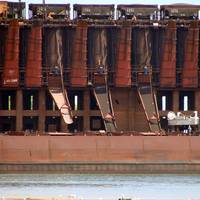
Shipments of iron ore from U.S. ports on the Great Lakes decreased 14.2 percent from 2024 to 4.7 million tons in September. Shipments were below the month’s 5-year average by 7.4 percent.Year-to-date, the iron ore trade stands at 31.4 million tons, a 14 percent decrease compared to last year. Through September, iron ore loadings are 6.6 percent below their 5-year average for the first three quarters of the year.Since 1880, Lake Carriers’ has represented the U.S.-flag Great Lakes fleet…
Great Lakes Iron Ore Trade Down in August
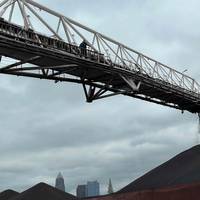
Iron ore shipments on the Great Lakes in August totaled 5 million tons, a 9.1 percent decrease compared to last year. Shipments were below the month’s 5-year average by 2 percent.Year-to-date, the iron ore trade totals 26.7 million tons, a decrease of 13.9 percent compared to the same point in 2024.Through August, iron shipments are 6.4 percent below their 5-year average for eight months of the year.Great Lakes Iron Ore Shipments: August 2020-2025 and 5-Year AverageIncludes Transshipments to Quebec City for Shipment Overseas(net tons) AveragePort2020202120222023202420252020-2024Duluth…
Brazil Ships More Iron Ore to China, Competitors Lag
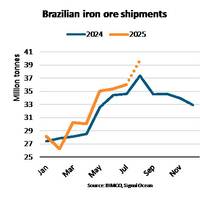
Between January and August 2025, Brazilian iron ore shipments are expected to rise 4% y/y, supported by stronger mining activity. Shipments to China have increased despite weaker demand, replacing shipments from Australia, Peru and India, says Filipe Gouveia, Shipping Analysis Manager at BIMCO.Brazil is the world’s second-largest exporter of iron ore, accounting for 23% of global shipments, while Australia leads with 54% of cargoes. Out of global shipments, 73% are destined for China while an additional 11% go to other East Asian countries.
Great Lakes Iron Ore Shipments Slip in July; Year-to-Date Totals Lag
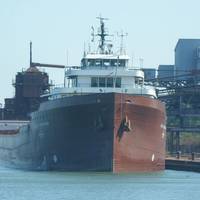
The Great Lakes iron ore trade lost momentum in July, with shipments totaling 5.1 million tons — a 10.9% decline compared to the same month in 2024, according to the Lake Carriers’ Association (LCA). The July volume also came in 1.7% below the five-year average, signaling that weaker conditions are not just a one-month anomaly.The year-to-date picture is similarly soft. Through the first seven months of 2025, the Lakes fleet has moved 21.8 million tons of iron ore, down 14.9% from a year earlier and 7.3% below the five-year average.
Iron Ore 'Calm' in face of China Uncertainty, U.S. Tariffs
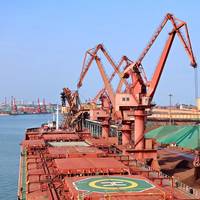
Iron ore prices have been a model of stability in recent months despite the increasing clouds over the outlook for the key steel raw material.The benchmark Singapore Exchange contract ended at $95.25 a metric ton on Monday, down from $95.89 at the previous close but up from the recent nine-month low of $93.35 on July 1.However, the range in the price between that low and the high so far in 2025 of $107.81 a ton on February 12 is a narrow $14.In 2024 the range between the high and the low was around $52 a ton…
Great Lakes Iron Ore Trade Down in June
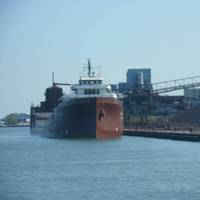
Shipments of iron ore on the Great Lakes totaled 4.9 million tons in June, a decrease of 9.6% from 2024. Shipments were 1.2% below the month’s five-year average.Year-to-date the iron ore trade stands at 16.6 million tons, a decrease of 16.1% compared to the previous year’s total. Iron shipments are below their five-year average by 8.9% for the first half of the year.Since 1880, Lake Carriers’ has represented the U.S.-flag Great Lakes fleet, which today can move more than 90 million tons of cargos annually that are the foundation of American industry…
Video: ATBs Unlock Stranded Iron Ore Down Under
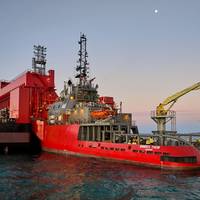
Australia’s unique enclosed self-discharging transhippers ensure a dust-free supply chain for the Onslow Iron project.Onslow in north Western Australia is a desert. It receives less than 10 inches of rain a year, and for much of the year temperatures reach 95 degrees Fahrenheit. It’s known for dust storms that can turn the town red.It’s iron ore country, but the lack of a deepwater port meant that the nearby resources were stranded until Mineral Resources (MinRes) came up with…
Great Lakes Iron Ore Trade Down in April
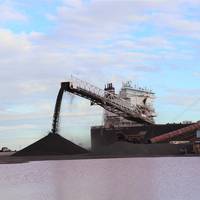
Iron ore shipments on the Great Lakes totaled 3.7 million tons in April, a decrease of 18.7% compared to 2024. Shipments were 19.1% below the month’s five-year average.Year-to-date, the iron ore trade stands at 6.7 million tons, a decrease of 25.1% compared to a year ago. Through April, iron ore shipments are 17.4% below their five-year average for four months of the year.Since 1880, Lake Carriers’ has represented the U.S.-flag Great Lakes fleet, which today can move more than 90 million tons of cargos annually including iron ore…
Great Lakes Iron Ore Trade Drop Below Five-Year Average in March
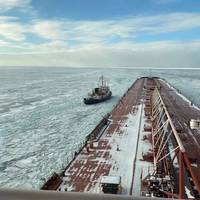
Shipments of iron ore on the Great Lakes were below one million tons in March, a decrease of 39.1% compared to 2024, reports the Lake Carriers’ Association. Loadings were also below the month’s five-year average by 19.4%.Year-to-date, the iron ore trade stands at nearly three million tons, a decrease of 31.9% compared to a year ago. Iron ore shipments are 15.2% below their five-year average for the first three months of the year.Since 1880, Lake Carriers’ has represented the U.S.-flag Great Lakes fleet…
Global Seaborne Iron Ore Trade will be Rocked by Guinea's Simandou Mine

The term gamechanger is often over used enough to be rendered meaningless, but the huge Simandou mine in the West African country of Guinea is going to be just that as its start up is set to rock the seaborne iron ore market.The first cargoes from the project may arrive by the end of this year and it's expected that it will ramp up to its full capacity of 120 million metric tons per annum fairly quickly.The four blocks of Simandou are impressive in their scale and infrastructure challenges…
Iron Ore Shipments Fall 7%
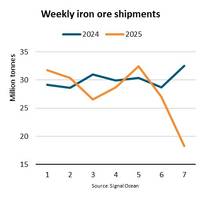
Global iron ore shipments have fallen 7% y/y, during the first seven weeks of 2025, amid supply disruptions and weak Chinese import demand. Australian cargoes have fared the worst, down 10% y/y while shipments from Brazil have weakened by 5% y/y.“The comparatively stronger Brazilian shipments are boosting average sailing distances, but tonne mile demand is nonetheless estimated to have taken a 6% fall y/y,” says Filipe Gouveia, Shipping Analysis Manager at BIMCO.The weakness of iron ore shipments this year has intensified this past week in particular.
Cyclones Delay Rio Tinto Exports from Australia
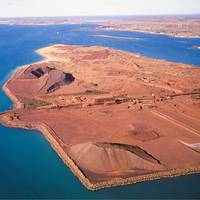
Rio Tinto said on Tuesday it had begun clearing iron ore ships from two Western Australian ports as two tropical cyclones offshore swell seas and complicate its efforts to repair infrastructure damaged by a previous cyclone last month."Safety is our priority. As is procedure, we began sending ships from Cape Lambert Port at the weekend and Dampier Port last night, out to sea, to avoid high sea swells and wave conditions created by Tropical Cyclone Taliah and Tropical Cyclone Vince…
Iron Ore Shipments Up 3.8% Despite Weak Chinese Demand
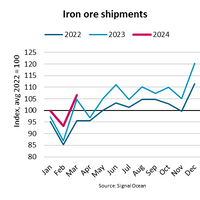
In the first quarter of 2024, global iron ore shipments rose 3.8% y/y on expectation of strong Chinese steel production which, however, failed to materialise. Iron ore supply has grown faster than Chinese demand which could lead to weaker shipments ahead, says Filipe Gouveia, Shipping Analyst at BIMCO.During the start of the year, Brazilian iron ore shipments typically slow down due to mining disruptions caused by heavy rainfall. However, this year conditions were better and Vale…
MSI: Iron Ore Market is Flashing Warning Signs
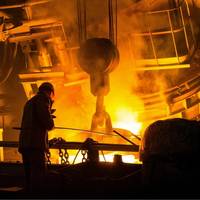
In its August HORIZON Dry Bulk month report, Maritime Strategies International states that against potential optimism from lower interest rates to come, price action in the iron ore market has been flashing warning signs. Prices have dropped about 10% since the start of the month and are now 30% lower than at the start of the year.With the freight market highly leveraged to iron ore flows (the largest dry bulk commodity), the response by suppliers will be critical. While it is…
China Demand Drives 7% Jump in Minor Ore Exports
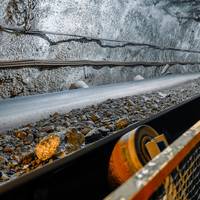
“Driven by continued growth in minor ore demand in China, global seaborne minor ore exports rose 7% y/y in the first seven months of 2023, vastly outpacing the 2% y/y growth in overall dry bulk exports,” says Filipe Gouveia, Shipping Analyst at BIMCO.Accounting for 51% of seaborne minor ore exports, bauxite exports also led year to date growth with a 9% y/y increase. Bauxite is refined into alumina, the primary ingredient in aluminium production.Chinese aluminium production has rapidly increased since the start of the Ukraine war.
ABS Opens Office in World’s Largest Iron Ore Export Town
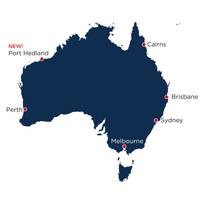
ABS is expanding its footprint in Western Australia, establishing a physical presence in Port Hedland, a key trading zone for dry bulk minerals in the Eastern Hemisphere. The new site joins other ABS locations in Perth, Cairns, Brisbane, Sydney and Melbourne.Port Hedland, the world’s largest iron ore export port, is located within the Pilbara region in northwest Australia. The area is making substantial investments to support the energy transition to meet net-zero emissions goals.
Study Highlights Ammonia Bunkering Potential of Australia’s Pilbara
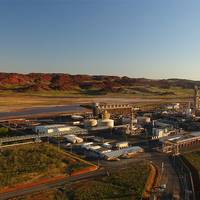
A feasibility study has highlighted the potential for using clean ammonia to refuel ships, particularly iron ore carriers, visiting the Pilbara region of Western Australia.The study, commissioned by Yara Clean Ammonia (Yara) and Pilbara Ports, was undertaken by Lloyd's Register, and looked at key areas including the estimated demand and likely availability of ammonia as a replacement shipping fuel. The potential risks and regulatory requirements for ammonia bunkering at the ports…
Record Exports from Australia’s Pilbara Ports
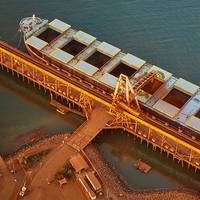
The Pilbara region of Australia has achieved a record 758.3 million tonnes of exports passing through its ports in the 2023-24 financial year.This marks the fifth consecutive year of record-breaking throughput for Pilbara Ports.The Port of Port Hedland contributed significantly to this achievement with a throughput of 573.6 million tonnes.The commodities exported through Pilbara Ports in 2023-24 were valued at an estimated A$173.2 billion.Pilbara Ports play a crucial role in facilitating Australia’s iron ore trade…
Great Lakes 2024 Iron Ore Trade Dips 2.5 PCT
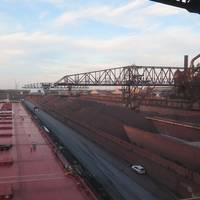
Shipments of iron ore on the Great Lakes totaled 4.6 million tons in December, a decrease of 4.5 percent compared to a year ago. Shipments were just slightly above the 5-year average for the month.The year-end total for the iron ore trade stands at 49.8 million tons, a decrease of 2.5 percent compared to 2023.Compared to the trade’s 5-year average, 2024 iron ore loadings were up 3.8 percent.Since 1880, Lake Carriers’ has represented the U.S.-flag Great Lakes fleet, which today can move more than 90 million tons of cargos annually that are the foundation of American industry…
Broad Sector Declines puts Baltic Index at 17-month low
The Baltic Exchange's dry bulk sea freight index, which tracks rates for ships carrying dry bulk commodities, fell on Wednesday, hitting its lowest level in nearly 17 months, as rates dipped across all vessel segments.The index, which factors in rates for capesize, panamax and supramax shipping vessels, fell 25 points to 1,028 points, hitting its lowest level since July 2023.The capesize index shed 71 points to 1,237 points, also hitting its lowest level since Sept. 2023. Average daily earnings for capesize vessels, which typically transport 150,000-ton cargoes such as iron ore and coal, decreased by $587 to $10,261.Iron ore futures prices slipped on Wednesday, as supply concerns eased and demand slowed marginally due to maintenance of more furnaces by steelmakers in top consumer China.











